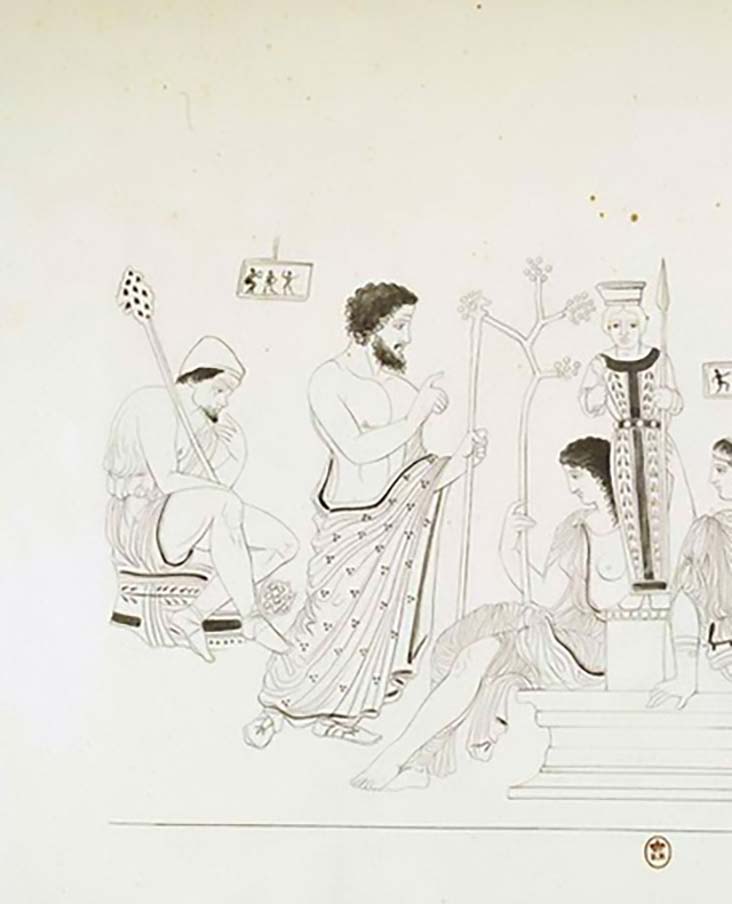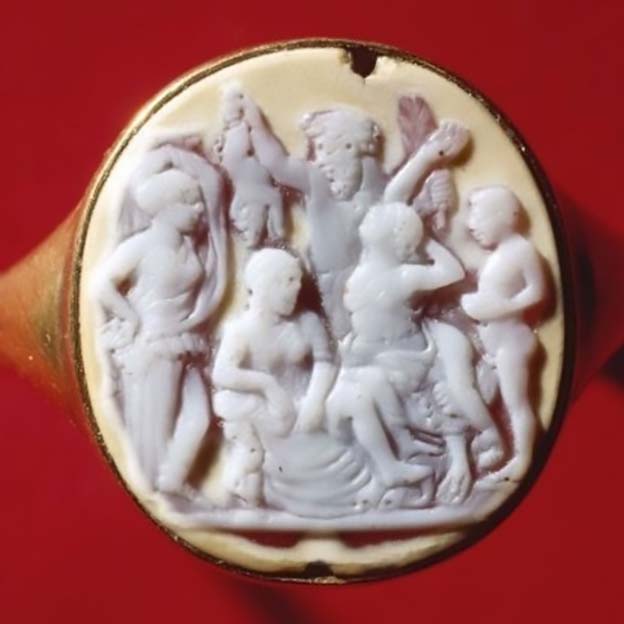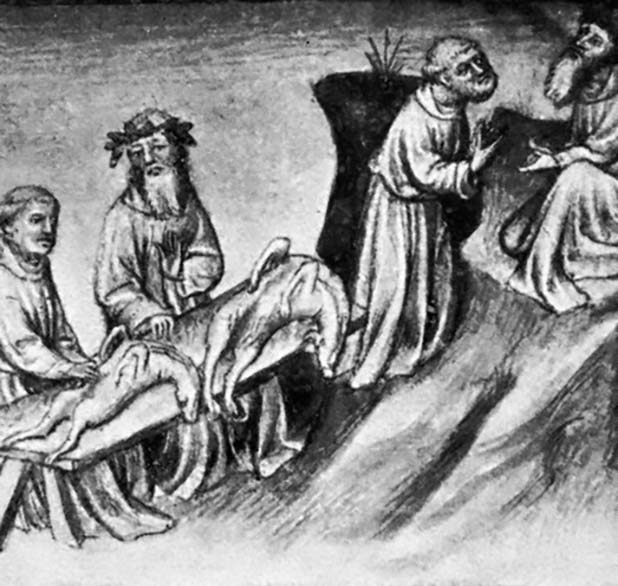Melampus
Melampus, was a son of Amythaon by Idomene, or according to others, by Aglaea or Rhodope, and a brother of Bias. He was looked upon by the ancients as the first mortal that had been endowed with prophetic powers, as the person that first practiced the medical art, and established the worship of Dionysus in Greece. He is said to have been married to Iphianassa (others call her Iphianeira or Cyrianassa), by whom he became the father of Mantius and Antiphates.
Apollodorus adds a son, Abas; and Diodorus calls his children Bias, Antiphates, Manto, and Pronoe. Melampus at first dwelt with Neleus at Pylus, afterwards he resided for a time at Phylace, near Mount Othrys, with Phylacus and Iphicles, and at last ruled over a third of the territory of Argos. At Aegosthena, in the north-western part of Megaris, he had a sanctuary and a statue, and an annual festival was there celebrated in his honor.
With regard to his having introduced the worship of Dionysus into Greece, Herodotus thinks that Melampus became acquainted with the worship of the Egyptian Dionysus, through Cadmus and the Phoenicians, and his connection with the Dionysiac religion is often alluded to in the ancient writers. Thus, we are told, for example, that he taught the Greeks how to mix wine with water. Diodorus further adds that Melampus brought with him from Egypt the myths about Cronus and the fight of the Titans.
As regards his prophetic power, his residence at Phylace, and his ultimate rule over a portion of Argos, the following traditions were current in antiquity. When Melampus lived with Neleus, he dwelt outside the town of Pylus, and before his house there stood an oak tree containing a serpent's nest. The old serpents were killed by his servants, and burnt by Melampus himself, who reared the young ones.
One day, when they had grown up, and Melampus was asleep, they approached from both sides and cleaned his ears with their tongues. Being thus roused from his sleep, he started up, and to his surprise perceived that he now understood the language of birds, and that with their assistance he could foretell the future. In addition to this he acquired the power of prophesying, from the victims that were offered to the gods, and, after having had an interview with Apollo on the banks of the Alpheius, he became a most renowned soothsayer.
During his stay with Neleus it happened that his brother Bias was one of the suitors for the hand of Pero, the daughter of Neleus, and Neleus promised his daughter to the man who should bring to him as a gift for the maiden, the oxen of Iphicles, which were guarded by a dog whom neither man nor animal could approach. Melampus undertook the task of procuring the oxen for his brother, although he knew that the thief would be caught and kept in imprisonment for one whole year, after which he was to come into possession of the oxen.

Things turned out as he had said; Melampus was thrown into prison, and in his captivity he learned from the wood-worms that the building in which he was would soon break down. He accordingly demanded to be let out, and as Phylacus and Iphicles became thus acquainted with his prophetic powers, they asked him in what manner Iphicles, who had no children, was to become father.
Melampus, on the suggestion of a vulture, advised Iphicles to take the rust from the knife with which Phylacus had once cut his son, and drink it in water during ten days. This was done, and Iphicles became the father of Podarces. Melampus now received the oxen as a reward for his good services, and drove them to Pylus; he thus gained Pero for his brother, and henceforth remained in Messenia.
His dominion over Argos is said to have been acquired in the following manner. In the reign of Anaxagoras, king of Argos, the women of the kingdom were seized with madness, and roamed about the country in a frantic state. Melampus cured them of it, on condition that he and his brother Bias should receive an equal share with Anaxagoras in the kingdom of Argos.
Others, however, give the following account. The daughters of Proetus, Iphinoe, Lysippe and Iphianassa, were seized with madness, either because they opposed the worship of Dionysus, or because they boasted of equalling Hera in beauty, or because they had stolen the gold from the statue of the goddess. Melampus promised to cure the women, if the king would give him one-third of his territory and one of his daughters in marriage.
Proetus refused the proposal: but when the madness continued, and also seized the other Argive women, messengers came to Melampus to request his aid; but he now demanded two-thirds of the kingdom, one for himself, and the other for his brother. The demand was complied with, and with a band of youths, he pursued the women as far as Sicyon, with Bacchic shouts.
Iphinoe died during the pursuit, but the surviving women were cured by purifications in a well, Anigrus, or in a temple of Artemis near Lusi, or in the town of Sicyon itself; and Melampus and Bias married the two daughters of Proetus.

Sources
Pseudo-Apollodorus. The Library i, 9.1
Diodorus Siculus. Historical Library iv, 68
Scholiast on Theocritus, iii, 43.
Pseudo-Apollodorus. The Library ii, 2.2.
Diodorus Siculus. Historical Library iv, 68
Servius on Virgil's Eclogues vi, 48.
Homer. Odyssey xv, 225 ff.
The Library i, 9.13.
Pausanias. Description of Greece vi, 17.4.
Homer, l.c.
Pausanias. Description of Greece i, 44.8.
Histories ii, 49.
Athenaeus, ii, p. 45;
Eustathius on Homer, p. 1816.
Historical Library i, 97.
Pseudo-Apollodorus. The Library i, 9.11
Eustathius on Homer, p. 1685.
Pseudo-Apollodorus. The Library i, 9.12
Pausanias. Description of Greece iv, 36.2
Scholiast on Theocritus, iii, 43.
Pausanias. Description of Greece ii, 18.4;
Diodorus Siculus. Historical Library iv, 68.
Diodorus Siculus, l.c.
Pseudo-Apollodorus. The Library i, 9.12.
Servius on Virgil's Eclogues, vi, 48.
Pseudo-Apollodorus. The Library ii, 2.2
Strabo. Geography viii, p. 346
Ovid. Metamorphoses xv, 322
Pausanias. Description of Greece ii, 7.8; viii, 18, in fin.
Herodotus. Histories ix, 34
Scholiast on Pindar's Nemean Odes ix, 30.
"Encyclopedia Mythica"













